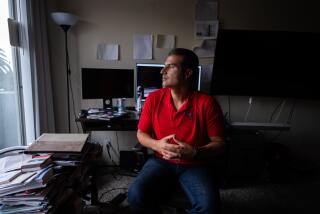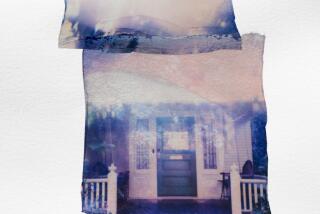A translator’s journey from Iraq to Long Beach
- Share via
Mohammed Al-Rawi’s passion for computers carried him through the war in Iraq all the way to the shores of California. His fluency in Windows and in English landed him a job with journalists, put him in the path of multiple bomb and rocket attacks, and brought him here, along with his wife and two young children, for their first Fourth of July in the United States. Like so many new Iraqi immigrants, he has much to celebrate this Independence Day, and much to mourn.
At 21, Al-Rawi ran an Internet cafe in the basement of Baghdad’s Flowersland Hotel. He knew how to breach Saddam Hussein’s firewalls to access forbidden websites, and in the weeks leading up to the U.S. invasion he helped reporters send their material out of the country. Then government monitors traced a photograph of the president to his computer, and he went into hiding until he saw the first U.S. tanks roll into his southern Baghdad neighborhood and one of the first U.S. soldiers on the ground, an African American in dark glasses with an M-16. “It was just like in the movies,” he says.
The Iran- Iraq war had forced Al-Rawi’s family to flee their hometown of Basra two decades before. His Shiite mother and Sunni father watched with apprehension in 2003 as war — and the Americans — arrived at their doorstep once again. “They’ll ruin the country, because they don’t know anything,” his father warned. But Al-Rawi thought he was wrong.
“I was so happy when they came,” Al-Rawi said. “Maybe because almost everyone believes in America and how great the country is. I was so sure they would come and fix everything, that we’d have resources and they’d have a plan.”
International businesses and aid organizations poured into the country almost overnight. Translators, computer techs and drivers were in high demand. Al-Rawi went to work first for Associated Press television and then for the Los Angeles Times.
Almost as quickly, an insurgency took shape. It seemed as if anyone with a grievance against the United States came to Iraq to fight the American imperialists alongside militant Iraqis and Al Qaeda. Al-Rawi’s first encounter with them came on Dec. 31, 2003. He took his fiance, Atiaf Matrook, to a restaurant to meet his colleagues and usher in the new year. They realized the table they had reserved was too small for the group that would arrive, so they moved to another just before a suicide bomber rammed his automobile into the restaurant. The two couples who had taken their place at the original booth were killed.
Al-Rawi’s second brush with violence came in 2004 as he was installing a satellite dish on the roof of the office for a computer network. He stepped away a moment before incoming rocket fire destroyed the dish. Al-Rawi was lucky, and so at first were the rest of the newspaper’s Iraqi staff. Sunni and Shia, Arab and Kurd, they worked together keeping computers and generators running, gathering information and educating a revolving door of American reporters in the complexities of Iraq. They kept their jobs secret from all but intimate family members. In the end, it was too much to hope they would be spared the bloodshed that the reporters chronicled day in and day out. First, one of the Sunni translators lost a son in the war, then a Shiite lost his. The staff was consumed with grief.
“In situations like that, you just hang on to the people you trust,” Al-Rawi said.
As the war dragged on, Al-Rawi’s hopes for a new Iraq faded. His neighborhood became more sectarian; he sent his wife and children out of the country, and when his neighbors expressed suspicions about his job, he started sleeping with an AK-47 nearby. The United States began to open its doors to those who felt they were in danger for having worked — collaborated, some would say — with the Americans. Like so many others, Times translators started to give up on what one called “the new Iraq that expels and annihilates its own people.” One by one, they began to leave.
The final straw for Al-Rawi was in January. Two explosions down the block from the newspaper’s offices served as a warning. Al-Rawi helped gather the others into an interior hallway just before the windows and computers where they had been working shattered in the next blast. One translator was cut by glass, but everyone else survived. A month later, visas in hand, Al-Rawi and his family arrived in Los Angeles.
The family settled in Long Beach for the good schools and companionship of a fellow translator, and a friend found Al-Rawi an office job. He bought his family a summer pass to Knott’s Berry Farm. Tonight, they’ll eat barbecue and watch fireworks. He feels fortunate, but he and his wife miss their parents terribly and sometimes find the changes overwhelming. When his new American neighbors ask him whether his country is better off for the U.S. war in Iraq, he hesitates. He recalls his father’s admonition about the Americans: “I realized he was right.”
Saddam Hussein is gone, but Iraq still is not fully free, and, at 28, Al-Rawi had to leave Iraq to find the peace and promise he sought for his family. That’s the bittersweet reality of Al-Rawi’s first Fourth of July in the United States. “Before the war, I was an Iraqi,” he said. “From 2003 to 2004, we were Iraqis working with the American media. In 2005 until the day we left, I was considered an American spy by hardcore Iraqis. Now, I am becoming American.”
Marjorie Miller is a member of the Times’ editorial board. From 2002 to 2008, she was the paper’s foreign editor.
More to Read
Sign up for Essential California
The most important California stories and recommendations in your inbox every morning.
You may occasionally receive promotional content from the Los Angeles Times.













